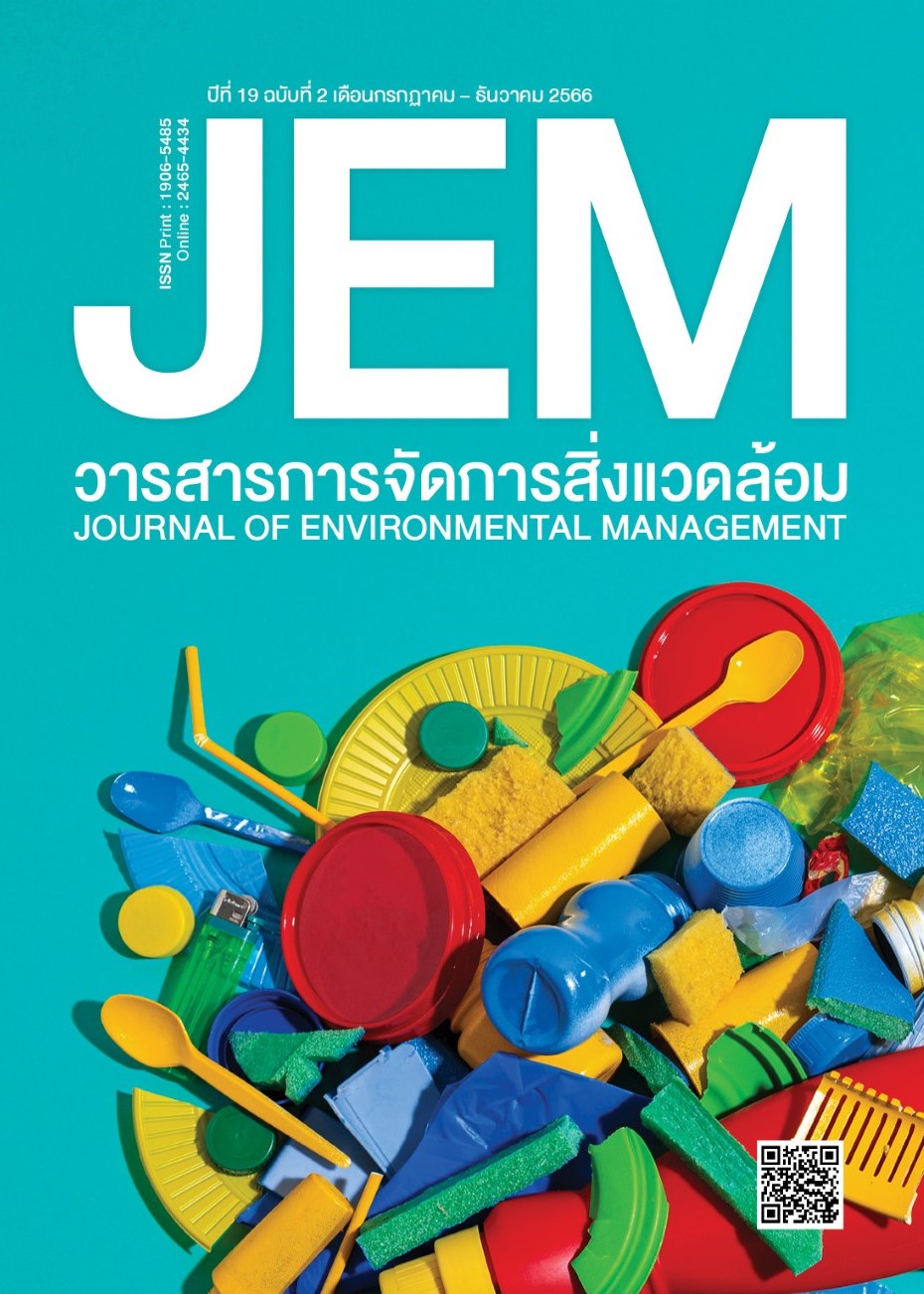ปัจจัยสนับสนุนต่อความสำเร็จในการจัดการสิ่งแวดล้อมชุมชน (กรณีศึกษา: ชุมชนในเขตเทศบาลเมือง จังหวัดประจวบคีรีขันธ์)
DOI:
https://doi.org/10.14456/jem.2023.10คำสำคัญ:
การจัดการสิ่งแวดล้อมชุมชน, เทคนิคเดลฟาย, ฉันทามติบทคัดย่อ
ความมุ่งหมายของการศึกษาวิจัยนี้ คือ เพื่อระบุถึงปัจจัยที่สนับสนุนการจัดการสิ่งแวดล้อมชุมชน, กรณีศึกษา เขตเทศบาลเมือง จังหวัดประจวบคีรีขันธ์ ในการดำเนินการศึกษาการวิจัยนี้ เทคนิคเดลฟายซึ่งเป็นเทคนิคที่ช่วยให้บรรลุฉันทามติของผู้มีส่วนได้ส่วนเสียที่มีความหลากหลายได้ถูกนำมาใช้
ผลการศึกษาพบว่า ปัจจัยที่ถูกคัดเลือกมี 10 ปัจจัย โดยจำแนกได้ 4 องค์ประกอบ คือ องค์ประกอบด้านงบประมาณ จำนวน 3 ปัจจัย ด้านความรู้และเทคโนโลยี จำนวน 3 ปัจจัย ด้านการสร้างเครือข่ายจำนวน 2 ปัจจัย และด้านการมีข้อมูลชุมชน และผู้นำในการจัดการ จำนวน 2 ปัจจัย องค์ประกอบที่สนับสนุนต่อการจัดการสิ่งแวดล้อมชุมชนมากที่สุด คือ องค์ประกอบด้านงบประมาณ รองลงมา คือ องค์ประกอบด้านการได้รับความรู้และเทคโนโลยี ด้านการมีผู้นำและข้อมูลชุมชน และ การสร้างเครือข่าย ตามลำดับ ข้อค้นพบจากการศึกษานี้ สามารถนำไปใช้ประโยชน์ในการกำหนดแนวทาง หรือจัดทำตัวชี้วัดความสำเร็จในการจัดการสิ่งแวดล้อมชุมชนที่ยั่งยืนต่อไป
เอกสารอ้างอิง
Bangmo, S. (2015). Organization and Management (7th ed.) [In Thai]. Bangkok: Witthayaphat Co., Ltd.
Boonruang, B., Uttayotha, S., Muenjaem, S., & Tantranont, N. (2019). Transformational leadership model for resource and environmental management of green economy community in Uttaradit Thailand [In Thai]. Journal of Interdisciplinary Research, 8(1), 109-118.
Boyd, B.L. (2003). Identifying competencies for volunteer administrators for the coming decade: A national Delphi study. Journal of Agricultural Education, 44, 47-56.
Charoensin, W.& Rattanasak, T. (2016). The community network building of environmental in Sa-eab Sub- district, Song District, Phrae Province [In Thai]. In Khon Kaen University: The National and International Graduate Research Conference 2016. (p. 931-938).
Dajani, J.S., Sincoff, M.Z., & Talley, W.K. (1979). Stability and agreement criteria for the termination of Delphi studies. Technical Forecasting and Social Change, 13, 83-90. Retrieved July 31, 2022 from https://doi.org/10.1016/0040-1625(79)90007-6.
Dalkey,N.C. (1972). The Delphi method: an experimental study of group opinion. In: Dalkey, N.C., Rourke, D.L., Lewis, R., Snyder, D. (Eds.). Studies in the quality of life: Delphi and decision-making (pp. 13-54). Lexington, MA: Lexington Books.
Delbecq, A.L., Van de Ven, A.H., & Gustafson, D.H. (1975). Group techniques for program planning: A guide to nominal group and Del-phi processes. Glenview, III: Scott, Foresman, and Co.
Glaser, B.G., & Strauss, A. L. (1967). The Discovery of Grounded Theory: Strategies for Qualitative Research. New York. Aldine De Gruyter.
Hsu, C.C., Sanford, B.A. (2007). The Delphi technique: Making sense of consensus. Practical Assessment, Research & Evaluation, 12(10).
Jarusombat, S. (2011). Potential of local government organizations on environmental management [In Thai]. King Prajadhipok’s Institute Journal, 9(1), 5-35.
Kasemsuk, N. (2014). Improve Hua Hin [In Thai]. Bangkok Business Newspaper. Retrieved June 4, 2023 from http://www.bangkokbiznews.com/news/601107.
Ketsakul, L. (2015). Public participation in environmental management: A case study of Bunthungsri community Rongkwang, Phrae Province, Thailand [In Thai]. (Master of Science). NIDA, The Graduate School of Environmental Development Administration, Environmental Management.
Macmilan, T.T. (1971, May). The Delphi Technique. Paper presented at the annual meeting of the California Junior Colleges Associations Committee on Research and Development, Monterey, California.
Masngammuang, B. (2019). The community attachment in peri-urban context: The case of Tha Tum, Mahasarakham Province [In Thai]. Dhammathas Academic Journal, 19(3), 13-22.
Miller, L. E. (2006, October). Determining what could/should be: The Delphi technique and its application. Paper presented at the meeting of the 2006 annual meeting of the Mid-Western Education Research Association, Columbus, Ohio.
Ministry of Natural Resources and Environment. (2018). Good governance for better life on 2018 [In Thai]. Retrieved June 2, 2023 from http://www.mnre.go.th/th/news/detail.
Murry, J. W., & Hammons, J.O. (1995). Delphi: A versatile methodology for conducting qualitative research. The Review of Higher Education, 18, 423-436.
Office of Natural Resource and Environmental Policy and Planning. (2004). Master plan of environmental management [In Thai]. Bangkok: Department.
Office of Natural Resource and Environmental Policy and Planning. (n.d). Community environmentalmanagement [In Thai]. Retrieved October 27, 2021 from http://www.community.onep.go.th.
Thansrisku, S. (2010). Factors affecting sustainable community development: A case study of local administration organization in Maha Sarakham Province [In Thai]. Chophayom Journal, 21, 51-68.
Urban Environment and Area Planning Division. (2018). Hua ban community Prachuap Khiri Khan province [In Thai]. Retrieved June 2, 2023 from http://community.onep.go.th/location/hua-ban-prachuap-Khiri-Khan/
Warner, L. A. (2015). Using the Delphi Technique to Achieve Consensus: A tool for Guiding Extension Programs. Retrieved September 13, 2022 from http://edis.ifas.ufl.edu/wc183.
Yotaga, B. (2013). Participation of Community members in Environmental of Thamai Municipal, Thamai District, Chanthaburi Province [In Thai]. Master of Science (Environmental management) NIDA, Bangkok.



